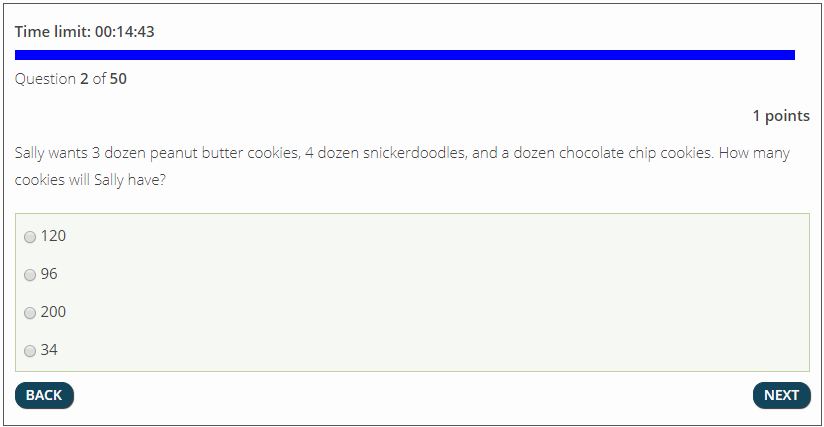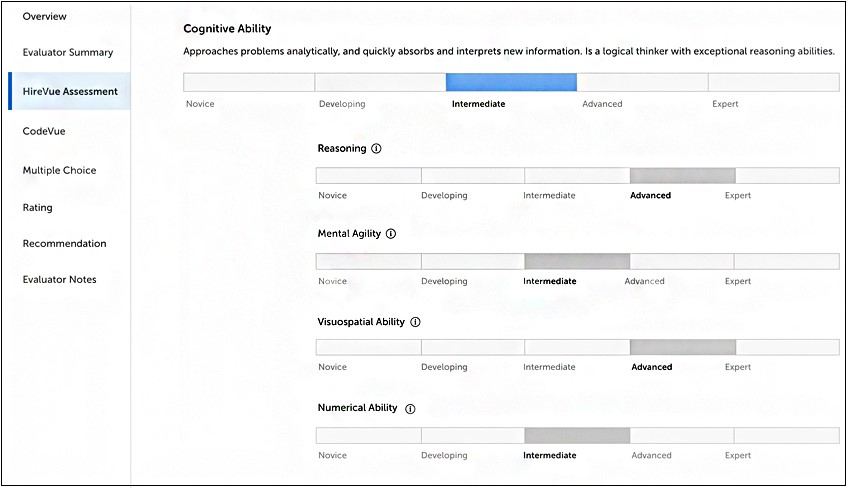Candidates: Are you interviewing and need support?
Pre-employment testing helps talent acquisition teams gauge candidates' hard and/or soft skills early in the hiring process. Teams use them to narrow the candidate pool quickly and objectively. And a variety of pre-employment testing or assessment formats are available, including:
- Traditional paper-based and online pre-employment testing assessments where candidates answer a series of closed-ended multiple-choice questions.
- Combined assessments that integrate pre-employment assessments and post-hire assessments.
- Predictive and/or engaging assessments that use data and/or artificial intelligence (AI) to assess candidates’ competencies and/or job fit or skills faster and without relying on closed-ended multiple-choice questions.
The newest entrant into the pre-employment testing field, game-based assessments, also called gamified assessments, falls into the engaging assessments category. While still newer, game-based assessments have already disrupted how companies assess candidates. And I believe games will be an ever-critical component of the future of pre-employment testing. Before I dig in to why, let me address the deficits of traditional or legacy assessments.
Traditional Assessments Create Anxiety
Traditional long, question-and-answer-based pre-employment tests use closed-ended questions. A large number of questions are needed to assess the candidate’s abilities or personality — often 100 or more questions. The length contributes to creating anxiety for candidates. That anxiety is compounded by perceived stereotype threat where candidates think they fall into a group stereotyped by the test and will score lower as a result. Additionally:
- Traditional assessments also take too much of a candidates’ time. The anxiety and time factors result in high drop-out rates. The result is that candidates don’t finish the assessment or do poorly for the wrong reasons.
- Closed-ended multiple-choice questions open the door for “guessing the right answer” and for answers being posted online, enabling candidates to “cheat.”
- Candidates can perceive a company that’s using a traditional assessment as outdated.
In the end, good candidates get dismissed or drop out and both employers — and their brands — and candidates miss out.

A sample traditional online pre-employment assessment question from the Criteria Cognitive Aptitude Test (CCAT) courtesy of .
Online assessments are usually traditional assessments that used to be taken on paper taken online. Online versions offer the advantages of automated scoring and real-time feedback for recruiters. But, they pose the same challenges as paper-based traditional assessments for candidates.
So, as a talent acquisition professional, how do you get the assessment data you need on candidates without creating a bad, anxiety-filled candidate experience and without risking losing good candidates?
You introduce a fast, fun, interactive way to assess candidates. One that doesn’t require the candidate to answer 100 questions and that makes it clear what you’re assessing. You use that critical component of the future of pre-employment assessments — game-based assessments in your assessment mix.
Games Make Pre-Employment Testing Engaging
Game-based assessments measure many of the same competencies as traditional question-and-answer-based pre-employment tests, including a number of cognitive abilities and emotional intelligence or EQ abilities. But games literally have the candidate play a game rather than complete a lengthy closed-end questionnaire. The game or games more accurately assesses the candidate completing a real job-based skill. Skills are assessed more quickly and in a more engaging, more modern, less biased way.
HireVue Game-Based Assessments test cognitive abilities, including mental agility, reasoning, the ability to understand and work with numbers, and visual and spatial awareness.
The Value of Games for Pre-Hire Assessments
Two key factors make games ideal for pre-employment testing today:
- Employers’ needs, which extends to candidates’ needs
- Available technologies
Games Fill the Needs of Employers and Candidates
Finding employees is a competition. As an employer, you have to move fast to ensure good candidates don’t get hired by another company. And you want to treat candidates like customers during the recruitment process.
Game-based assessments give you, as an employer, a tool to let candidates share their skills quickly and easily in a way that is fun and engaging. They’re modern and can be taken on any device anytime, anywhere — including a smartphone. You can assess candidates quickly and objectively. And you assess all candidates equally — while ensuring a good candidate experience.
Compared to static multiple-choice pre-employment tests, game-based assessments fill both your needs as an employer and your candidates' needs. That’s because games:
- Engage candidates by letting them play a game rather than simply answering multiple-choice questions and by sharing their performance data with them in real-time.
- Use a fun, interactive format that helps reduce test anxiety.
- Look modern and innovative to candidates across a range of demographics.
- Adapt to the test-taker so that what’s tested is consistent. Ideally, no two test experiences are identical. This reduces the chance that answers get posted online for other test takers to copy.
- Can be completed when and where the candidate is and on any device, including a mobile smartphone.
- Assess different abilities and candidate types — from hourly workers to leaders — using scientifically validated psychometric data.
- Give your recruiters an easy, scalable tool. A simple readout of a candidate's ability lets recruiters rapidly assess candidate pools of any size and quickly determine which candidates are ideal to move on to the next step in the hiring process.
Current Technologies Make Game-Based Assessments Possible
Game-based assessments use data and machine learning to provide a level of assessment not possible just 5 years ago.
Static questions analyze a single item and dimension of a candidate. Machine learning lets game-based assessments offer multidimensional insight into a candidate’s thinking and problem-solving abilities. It enables gathering thousands of data points on a candidate. Data gathered can include how long a candidate spends on a problem. The sheer quantity of data increases accuracy and granularity of the assessment and is captured in a much shorter time frame.
The best game-based assessments adapt to the candidate’s performance in real-time. If a candidate successfully completes one level in a game, the next level can automatically be more difficult. If he/she struggles with or fails with a level, the next one can be easier. By adapting to the user in real-time, games reduce anxiety, increase engagement, and reduce how long the assessment takes.
Recruiters see a roll-up of candidates’ results as soon as the game is complete. Before modern data-driven technologies, compiling results would have taken hours if not days. With today’s technologies, it takes minutes.
And technological advances won’t stop anytime soon. New advances will continue to drive new capabilities in game-based assessments.
What HireVue Is Doing with Game-Based Assessments
HireVue offers a variety of game-based assessments. Candidates play one, two or more games as part of the assessment process that measure competencies for:
- Cognitive abilities including mental agility, reasoning, the ability to understand and work with numbers, and visual and spatial awareness
- Emotional intelligence, including influence, collaboration, and impulse control
New games are added regularly.
HireVue Game-Based Assessments make it clear to candidates competencies related to the position they’ve applied for are being measured. They let candidates see their results. And they make the candidate experience and hiring process more fun, more fair, and faster. And each HireVue assessment is modeled on widely used scientifically validated cognitive assessments. And HireVue industrial-organizational (IO)/business psychologists and data scientists confirm all HireVue assessments deliver fair and less biased results.

HireVue Game-Based Assessments show the hiring team a candidate’s proficiency as novice, developing, intermediate, advanced, or expert for the assessed ability.
HireVue Game-Based Assessments are a component of HireVue Assessments with video interviewing and AI. They give you a comprehensive and engaging evaluation of candidates. Some companies, such as ManPower, are using HireVue Game-Based Assessments with their own assessments or by themselves.
Include Games in Your Candidate Assessment Strategy
Consider the value of knowing upfront if a candidate for a call center representative has good mental agility. Or if a researcher has a solid ability to understand and work with numbers. Or if a manager has solid problem-solving skills or just says he/she does.
While a traditional assessment can show you this, a game-based assessment can get you there quickly and more accurately with a deeper, more objective and accurate sense of the user’s abilities as they relate to the role in question.
And when you combine games with a video interview and AI, you see the full candidate, not just a given candidate’s ability to take a traditional test. You give your recruiters and hiring managers a way to more accurately, quickly, easily, and objectively assess candidates for any job role or need — and a way to stay one step ahead of competitors with a fun, engaging assessment experience.
Want to learn more about comprehensive pre-employment testing using games? Find it in The Next Generation of Assessments white paper.
Considering game-based assessments for your hiring toolkit? Find out what to consider when adding game-based assessments to your process.
About the Author
 Tom Cornell is an industrial-organizational (IO) psychologist at HireVue. Previously an IO psychologist at MindX, Tom provides subject matter expertise on HireVue Game-Based Assessments, consults with clients throughout the sales process, and supports delivery and innovation in HireVue’s internal research projects.
Tom Cornell is an industrial-organizational (IO) psychologist at HireVue. Previously an IO psychologist at MindX, Tom provides subject matter expertise on HireVue Game-Based Assessments, consults with clients throughout the sales process, and supports delivery and innovation in HireVue’s internal research projects.

